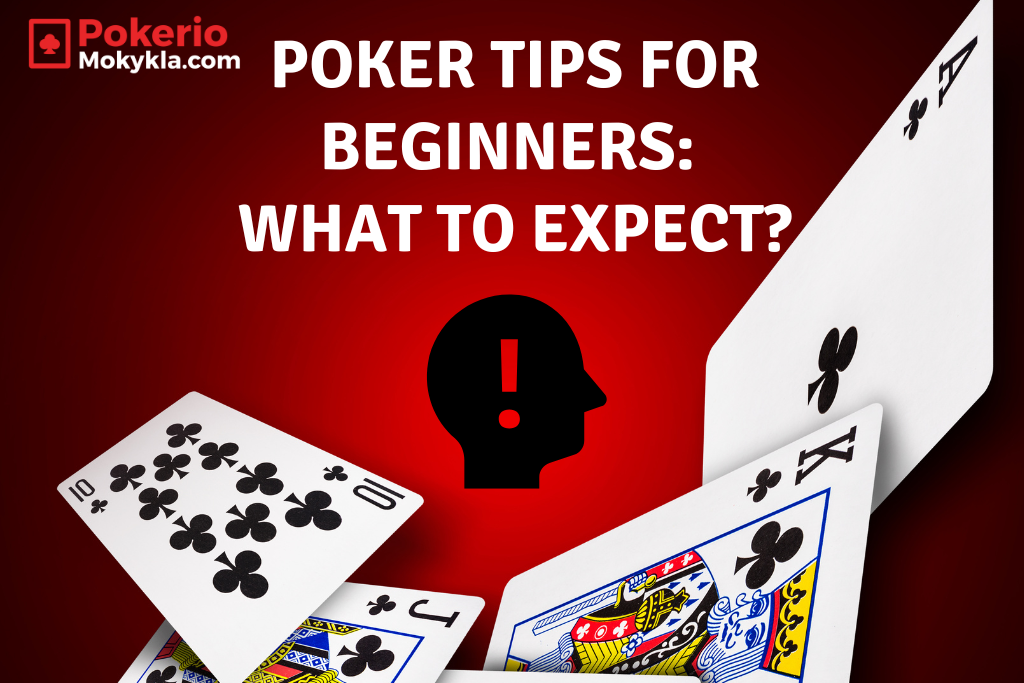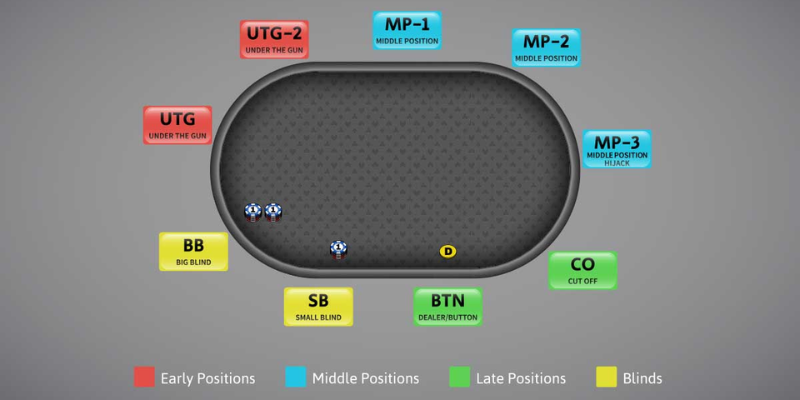
Poker Tips for Beginners
Poker Rules: Know Them Before Playing for Money
As primitive as it sounds, you must know the poker rules. You need to know the values of combinations, which combination is higher than another, etc. You cannot be a winning player without knowing the rules.
Importantly, some other poker games (e.g., Omaha, 7 Card Stud, Limit, Pot Limit, etc.) or tournaments (e.g., rebuy, knockout, etc.) have specific rules, so always find out where you intend to participate and what the rules are before you start playing.
Suited Cards Are Not as Good as They Seem
This is a mistake almost all beginners make, overestimating suited cards. The probability of hitting a flush when you have two suited cards is only 0.8%. And if you play with low suited cards, there is always a chance that someone has higher ones and will make a higher flush combination than you.
We simply recommend folding all low suited cards pre-flop, especially while you are a beginner.
Where is the Best Place to Play Poker?
Don't Overestimate Draw Hands
You will often find yourself in situations where you have an “incomplete hand,” where you are one card short of a good combination, say a flush draw, straight draw, etc.
Although these hands have great potential, you need to know how to play them well. If your opponent already has a good hand, you at best have only 30%, so you need to be good at calculating your winning probabilities and their ratio to the pot size.
Don't Jump into High Limits
There are two reasons why a beginner should play at low levels. First, at high levels, the level of players is much higher, i.e., your opponents will be much better than at low levels. Therefore, there is a very small chance that you will be able to beat them.
Second, you should only play at levels you can afford. You should play where you can afford to lose money. Importantly, without a good understanding of bankroll management, you will never become a good winning player, no matter how well you understand the game strategy.
More about: bankroll management (money management)
Be Attentive When You Play
The best way to gather information is to simply observe what your opponents are doing, how they behave, how much they bet, when they bet, etc. This way, you start to notice how each player plays and determine the strength of their cards based on their play. It's important to observe even when you are not in the hand, i.e., when you have folded your hand.
You will notice that players make certain moves when they have a good hand and different ones when they have a bad hand. The more information you have about your opponents, the better your chances of winning.
Always Think About Your Position

The importance of position is often underestimated not only by beginners but also by experienced players. As Phil Ivey once said, “I would lose even to my grandmother if she always had position on me.”
The best position in poker is the last one, as you get additional information about your opponents' actions, and information in poker is crucial.
Play Against Worse Players Than You
Although it sounds very obvious and primitive, many forget this rule. The rule is very simple: if you play against worse opponents, the money will end up in your pocket in the long run, and vice versa, if against better ones, your money will end up in their pockets.
There is a good poker saying: if you are the tenth best player in the world, you will still be a losing player if the other nine best players are at your table.
Think About Your Opponents' Cards
This is crucial, thinking not only about your own but also about the strength of your opponents' hands. Beginners often get a good card and see nothing else around them.
Beginners often get attached to pretty cards like AK, AQ, TT, JJ, but often in poker, you have to fold even KK, AA when bad community cards come out. For example, if four spades come out against three opponents, your red aces are practically dead, so you just need to let them go.
Don't Bluff Too Much
Another major mistake is the excessive desire to bluff. It is a misconception that to be a winning player, you need to bluff a lot. Although big bluffs are often shown in all poker shows like WSOP, EPT, WPT, etc., you need to understand that these are selected hands, and beginners often get a wrong impression about the frequency of professional bluffs.
If you are a beginner in poker, it is advisable to avoid bluffing. Just play your hands “straight.” For bluffing to be successful and profitable, you need to choose the right spot and opponent very well.
Don't Play Too Many Hands
One of the biggest mistakes beginners make is playing too many hands. Don't fall for the illusion that “any hand can win.” Although this is true, some hands have much higher probabilities of winning than others.
Good hand selection is essential to becoming a winning poker player.
What to Expect at the Beginning of Poker?
Don't Be Afraid to Lose
New players almost always enter the poker game very ambitiously, aiming to succeed and get rich on the very first night.
In reality, the probability of winning something impressive the very first time you start playing poker is similar to a backyard football team's chances of winning a match against the German national team.
Lots of ambitions and dreams, but… The worst scenario is if “luck” strikes and such a team wins, i.e., a player who just started playing poker wins.
Without even understanding the essence of the game, they might “rest on their laurels.” They might think they won with their intellect and can now beat anyone.
The most realistic expectation would be to lose the first tournaments or the first cash games, and also to lose the first deposits.
Consider it not as an investment in a big win, but as an investment in improvement, learning, and self-discovery as a poker player.
At the beginning, try to deepen your knowledge as much as possible, learn from good, accomplished players. A few hundred lost dollars, the knowledge gained, and the experience will earn you much more in the future and help you understand the simplest and most subtle details of the game.
Easy Money
In this case, when a beginner player dreams of “easy money,” this “easy money” can be just him for other players. Everyone plays poker for money, aiming to win (earn) it.
Therefore, no one is willing to easily give away their accumulated funds; everyone wants to win. In poker, money is earned through courage, persistence, patience, and continuous improvement.
At the beginning, try not to think about winnings, but focus all your attention on improving your game and expanding your psychological and logical thinking in poker. As your game improves, the amount of “easily” earned money will correspondingly increase.
A Constantly Learning and Improving Personality
Do you know the saying, “the deeper into the forest, the more trees”? It's the same in poker; the more you learn, the more you delve into it, the more you realize and see that more opportunities open up and even more paths and directions for improvement appear.
Prepare for continuous improvement, continuous learning in poker. We cannot say that we know everything in poker because such a thing does not exist. It is impossible to know everything in this field. Just consciously immerse yourself in this wonderful journey through the world of endless possibilities.
As one of the poker legends said, “it takes only 5 minutes to learn and a lifetime to master.”
Many things required in poker are irreplaceably important and useful in other activities and fields: poker mathematics knowledge, probability calculations, psychological preparation, patience and discipline development, understanding other people, body language, etc.
Accept it as a part of your life because everything you learn at the table will be useful in your everyday life.
Therefore, it is worth spending time to understand the poker game, dedicate yourself to it wholeheartedly and with boundless enthusiasm, immerse yourself in the subtleties of the poker game with all your heart, and harness the power of faith and positive thinking.
Emotional Swings
When faced with fears, a common scenario for people is: it seems like I'm not afraid, I'm ready for it, but as soon as I see it, my legs freeze.
Our mind is very weak compared to emotions, and emotions often dominate the mind, so don't be surprised if there are moments in poker when you don't understand what you're doing, especially when influenced by big wins or losses.
Don't Push Yourself
Everything happens slowly; poker is a complex strategic and tactical game, a sport, so we should dedicate time to improvement. You can't expect to fully understand the game in a day when others spend months or years on it.
It would be unfair; the game would lose its competitiveness against other games if everyone became experts just after starting to play. Improvement happens slowly; don't push yourself.
The same rule applies to winnings: moving up levels should happen slowly. Allow yourself to get used to the new level, make sure you feel confident, can handle this level, and have enough money to move higher. Only after positively answering all these questions should you move up.
Enjoy the Game
Everyone starts playing with joy, but lost pots, failures, unsuccessful bluffs, etc., can greatly spoil the mood. And when the mood is bad, it's hard to play and learn. Therefore, remember that you are learning at first, and failures are your straightest path to success, so accept them with joy.





